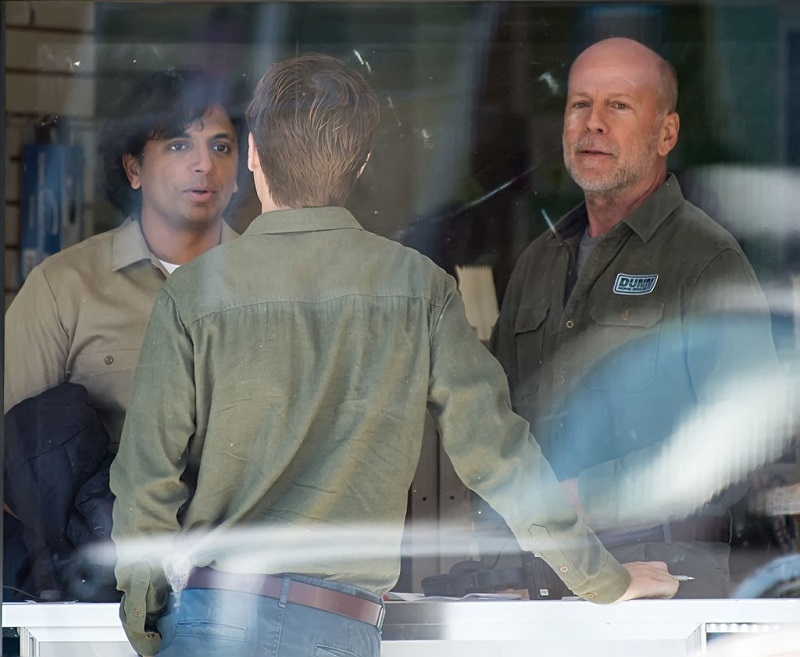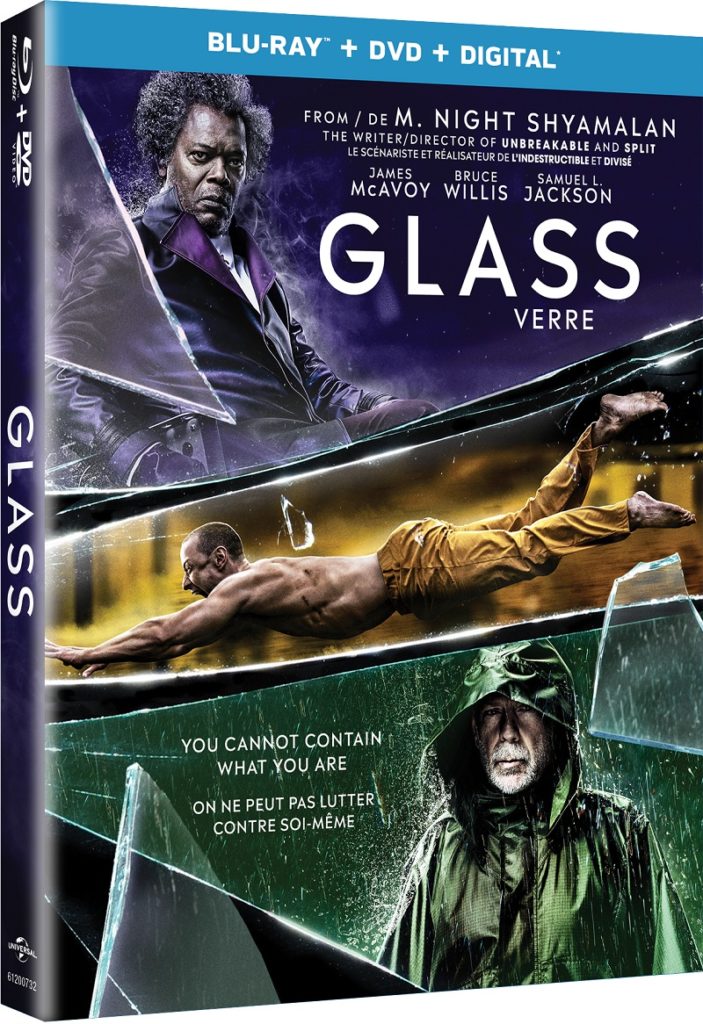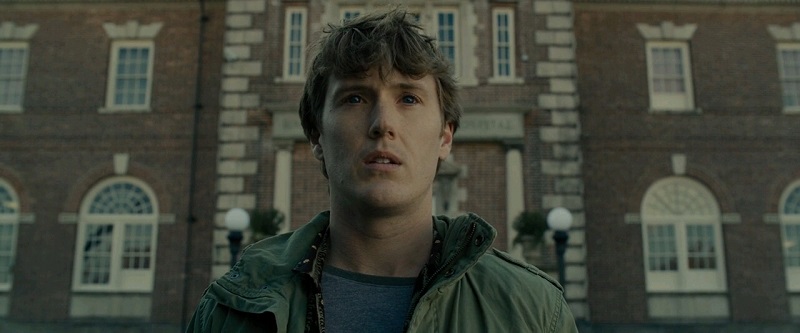In the final moments of Split, it was revealed that James McAvoy’s killer character existed within the haunting Unbreakable superhero universe. For actor Spencer Treat Clark, it was a revelation that informed him that he would soon be reuniting with Bruce Willis (who played his father in the 2000 flick) and filmmaker M. Night Shyamalan once again. After all, Unbreakable was now known as a first chapter, with Split the middle narrative of the saga and Glass the final spoke in M. Night’s trilogy wheel.

The Movie Mensch caught up with Clark for an exclusive chat about where he was when he heard about the incredible Split twist (hint: It wasn’t in a movie theater; someone ruined the surprise via text!) and his decades-long impression of the filmmaker who was once called “The Next Spielberg” by Newsweek. The budding thespian was 12 when he first hooked up with the Willis-Shyamalan talented tandem. He shares his experience of making that classic film that was way ahead of its time—given that superhero movies now seem to arrive at least once a month. That was not the case at the dawn of the century.
Even though he was merely a teenager, Clark was already a veteran performer with accomplished work alongside huge stars and visionary filmmakers. He starred with Tim Robbins and Jeff Bridges in Arlington Road and who could forget his youthful exuberance appearing opposite Russell Crowe and Joaquin Phoenix in legend Ridley Scott’s Oscar winning Gladiator.
He has worked steadily since (including his regular role in Marvel’s Agents of S.H.I.E.L.D. and now at 31 has come full circle in many ways with his work on Glass—out now on DVD, Blu-Ray and digital formats. Clark exclusively deals the deets on the magic of M. Night, returning to a character he played almost two-decades prior and what it’s like to have a front-row seat to moviemaking magic of the highest order.
The Movie Mensch: I have to start … being a part of this universe since the very beginning, did you know when Split came out that it shared the world with Unbreakable?
Spencer Treat Clark: No. I didn’t.
The Movie Mensch: Wow!
Spencer Treat Clark: Yeah, I found out after everybody else. It was pretty cool. It’s funny because I also was out of town that weekend. I was actually camping. So, I was even out of cell phone service. I got out of the mountains and I turned my phone back on. It was all lit up with people dinging.
The Movie Mensch: I bet.
Spencer Treat Clark: “Have you seen Split? Have you seen Split?! I was like, “I got it. I’m gonna watch it. I worked with him. I know. I’m obviously gonna see it.” Then unfortunately, somebody did tell me before going to see the movie. It would have been absolutely amazing to go in there and having not known. But people talked with us about a sequel, but I had no idea whether I’d be a part of it until I got a phone call from Night saying, “Hey, make sure you’re available this fall.”
The Movie Mensch: Then what?
Spencer Treat Clark: Even after that, it was many months before I got to read a draft of the script. So, I had no idea how involved my character could be. Night said on the phone call—because he was writing the script as we spoke—he was like, “You know, I’m writing the scene between you and I right now.” For all I knew my character could have died in the first four pages.
The Movie Mensch: Wow! I’m sure it was amazing to get all those phone calls lighting up your phone, but I just had this image of you sitting in the theater just wanting to stand up and say, “Hey, I’m in that world!”
Spencer Treat Clark: Yeah, I know.
The Movie Mensch: It was a shock to all of us.
Spencer Treat Clark: That would have been cool. Obviously in Split, the music for Unbreakable starts playing and I assume I would have picked up on that but, not necessarily. I mean, I have friends who picked up on it too. They were like, “Oh my God, that’s the Unbreakable music.”
The Movie Mensch: Over the years that film has really become one that has been endeared to people. Unbreakable was also way ahead of its time in its exploration of the nuances of superhero films and how they can be rich entertainment landscapes that also enlighten our world. What do you remember about that experience?

Spencer Treat Clark: I have many. I am excited to see the Blu-Ray when it comes out because I know there are some special features that sort of tie in all three movies and talk about the journey that Night has been on and that we’ve all been on with him. I was at the age where I was really starting to appreciate the craft of acting. As a twelve year old you’re not thinking in those terms. So, to some extent I knew what a big deal Bruce (Willis) and Sam (Jackson) were but you have this sort of naivete that you have at that age where I got to really be a blank slate and just sort of learn and appreciate it. Obviously, I am still learning so much now. It’s active. Every second I could be on the Glass set I was trying to watch Night and how he directs and watch James (McAvoy) and see what he does and how he prepares. But I think at 12 years old I just got to be around it and soaking it in. Also, as a 12-year-old you’re so not afraid to ask questions. Whether it’s Night or the actors even … just everybody! I remember getting to learn to check the gate, which is pretty much obsolete on film sets now. But making sure that there’s no hair or a speck of dust in front of the lens. I got to learn all that stuff because I was a precocious little 12-year-old and got to ask. So, the two experiences were absolutely different but intrinsically connected.
The Movie Mensch: I think you, almost more than anybody, can really see the bookends that are M. Night’s career. That was only his second movie and here we are at his most recent movie. How do you think he’s grown as a storyteller?
Spencer Treat Clark: That’s interesting. You know it’s really cool to see in the superhero genre, because you know Night is such a huge fan of the genre and obviously his movies have taken place over all sorts of different genres. But I think for him it was cool to get to return to the superhero genre after people are so much better versed in it. You’ve had this huge cultural phenomenon—these Marvel and DC movies. That wasn’t the case when Unbreakable came out. Night got to experience a completely different audience when he got to tell the story.

The Movie Mensch: How would you describe M. Night as a storyteller?
Spencer Treat Clark: Night is such a huge student of film. He loves cinema and all his camera moves are so purposeful. He’s maintained that style throughout and it’s so fun to be a part of. It’s a little bit daunting at times because things like blocking become so specific. With Night everything’s been story boarded out and that it’s gonna look amazing and that the camera is gonna help tell the story. There’s going to be these dramatic push ins that give the audience insight into what the characters feeling at any given point. I’m glad that Night has kept that sensibility and grown with it.
The Movie Mensch: In Glass, your character is truly a partner in crime to Bruce’s. Of course, he’s your dad, but you get to work with Bruce Willis on his missions, for lack of a better word. That’s kind of a nice way to pick up your character after 20 years or so. What did you think of the plot process and your involvement in the current movie?
Spencer Treat Clark: It was really cool! It’s nice that there were two really formative experiences in David’s life. Two central aspects sort of guide his character. One is, the fact that his mother has passed away, between Unbreakable and Glass. Then there’s that big change from Unbreakable. There’s the constant in that… in his love for his dad. Bruce, ironically, has played a really important role in my life, in my childhood, in a bizarre way. Not just as a fan, but personally and so it was cool to get to return to that.

The Movie Mensch: Is there a scene with Bruce that will stick in your head forever?
Spencer Treat Clark: I remember that scene, in the gun security, that was the second day of filming and my first day back working with Bruce. Everything just clicked, it felt really right, and the set felt awesome! I had a really clear vision of what I thought that set might look like and it turned out to be fairly consistent—probably because Night’s so clear about his vision on the page. It’s not a testament to me but a testament to Night.
The Movie Mensch: You found acting at such an early age and it’s such a tough business on a lot of levels. What was it about it that first appealed to you?
Spencer Treat Clark: Maybe because I found it at such a young age, but I feel like I’ve been able to be really vulnerable in front of the camera and something that I feel like I still let myself do now and realize maybe more and more to being vulnerable to the people around me as I grew up. [That is] something that I latched on to really early at a young age. I’m a fairly inquisitive person. There’s so many different experiences that you can encounter on a film set and so many different people with a huge degree of expertise. No one person can do every job on a film. So, you get all these people from incredible different backgrounds and I know that that’s something that appealed to me then and that I was aware of at a young age and is something that continues to appeal to me now. The constant of new people and new experiences and new opportunities. It’s fun preparing for a role and trying to get into someone’s psyche. I think I recognized at a young age I was extremely lucky to get to be around it and I knew that’s what I wanted to do.

